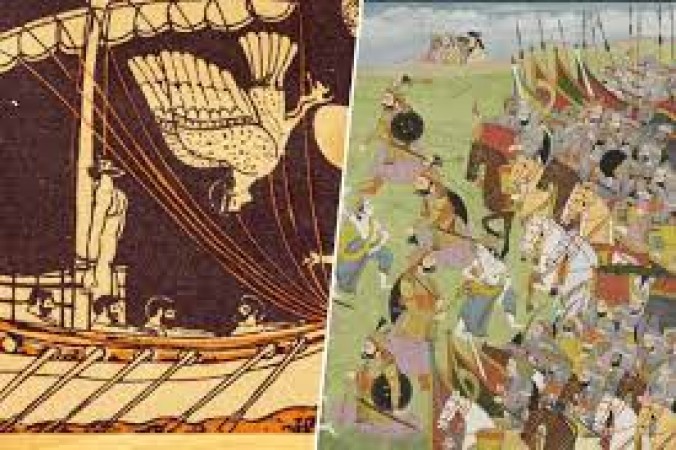
Epics have been an integral part of human storytelling for centuries. These grand narratives often depict heroic journeys, extraordinary adventures, and larger-than-life characters. They explore various themes that resonate with the human experience, leaving a lasting impact on readers and listeners alike. In this article, we will delve into three common topics that are frequently explored in epics.
**1. **The Hero's Journey: A Classic Theme
One of the most prevalent themes in epics is the hero's journey. This narrative archetype follows a hero as they embark on a transformative adventure, facing trials and tribulations to achieve a noble goal. The hero's journey typically consists of three main phases: departure, initiation, and return. Characters like Odysseus from Homer's "The Odyssey" and Arjuna from the Indian epic "Mahabharata" exemplify this timeless theme.
1.1 The Call to Adventure
The hero is called to leave their ordinary world and set out on a quest, often driven by a need to restore balance or confront a great evil.
1.2 Challenges and Allies
During the journey, the hero encounters challenges, battles foes, and gains allies who aid them in their mission.
1.3 Transformation and Revelation
Through these trials, the hero undergoes profound personal growth, discovering hidden strengths and wisdom that ultimately lead to their success.
**2. **The Conflict between Good and Evil: A Battle for Balance
Epics frequently explore the eternal conflict between good and evil. Heroes and villains symbolize the contrasting forces that exist within society and human nature. The battle between righteousness and malevolence adds depth and tension to the narrative, capturing the readers' imaginations.
2.1 Morally Complex Characters
In epic tales, characters often possess both virtuous and villainous traits, blurring the lines between good and evil. This complexity makes the story more compelling and relatable.
2.2 The Quest for Justice
Epics often revolve around the hero's quest to restore justice and bring about a harmonious world. This resonates with audiences as they long for a balanced and fair society.
2.3 Redemption and Sacrifice
Some epics explore the theme of redemption, showcasing characters who seek atonement for their past actions through acts of sacrifice and heroism.
**3. **The Exploration of Fate and Free Will: A Philosophical Dilemma
The tension between fate and free will is another recurring theme in epic literature. Characters grapple with the idea of destiny, questioning whether their actions are predetermined or a result of their choices.
3.1 Prophecies and Oracles
Epics often feature prophecies or oracles that foretell the protagonist's future, setting the course of events in motion.
3.2 The Power of Choice
Characters' decisions can have far-reaching consequences, challenging the notion of fate. Their choices and actions shape the story's outcome.
3.3 Acceptance and Defiance
Some characters embrace their destiny, accepting their fate, while others defy it, asserting their agency and challenging the established order. Epics serve as a rich tapestry of human experiences, touching upon themes that resonate with readers across cultures and generations. The hero's journey, the conflict between good and evil, and the exploration of fate and free will are just a few examples of the profound themes that these grand narratives explore.
From Mennonite Settlements to Tech Hub: Exploring Waterloo's Journey
Microsoft Teams Introduces Innovative Features to Combat Meeting Fatigue in the Remote Work Era
Unleashing Innovation: Saudi and Indian Tech Entrepreneurs Join Forces to Create Dynamic Ecosystem